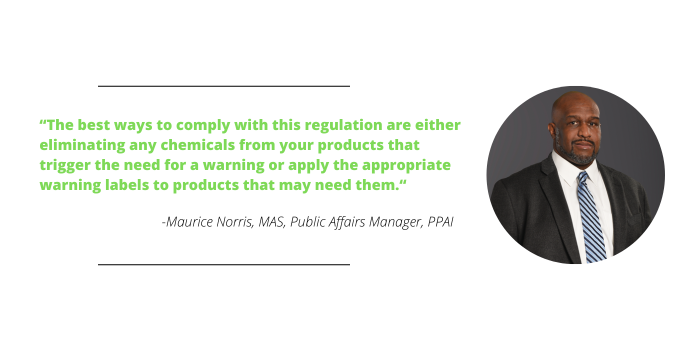Uptick Reported In Prop 65 Compliance Bounty Hunter Claims

PPAI Media has been made aware of a report that there has been an increase in bounty hunter claims concerning violations of Proposition 65, a California law intended to protect the state’s residents and drinking water sources from toxic chemicals and to inform its citizens about exposure to them. The claims can potentially put companies, including promotional products businesses, at risk of litigation, fines and additional expenses.
- Prop 65 requires meeting a strict criterion of labeling that could affect a number of consumer products.
- The threat of a claim being filed against a promotional product company in California underscores the importance of ensuring understanding and adherence to the law’s requirements.
- PPAI offers resources to help members protect themselves from being unwittingly blindsided by Prop 65’s compliance rules.
Prop 65 compliance has long been a topic of discussion at PPAI’s Product Responsibility Summit. This year’s event is October 8-10 in Alexandria, Virginia.
What Is Prop 65?
Prop 65, otherwise known as The Safe Drinking Water and Toxic Enforcement Act of 1986, is a California law that intends to protect citizens and water sources from toxic chemicals.
- Prop 65 requires specific labeling to announce the inclusion of certain chemicals in consumer products.
- The list of chemicals regulated under Prop 65 includes over 950 chemicals.
- That list is regularly updated.
Through a PPAI affinity partnership, PPAI members can access the QIMA database to search for specific chemicals and their relevance to Prop 65.

What Is A Prop 65 Bounty Hunter Claim?
Regarding laws such as Prop 65, a bounty hunter claim can often be initiated by a third party – such as an NGO or law firm – rather than an actual state agency.
Such organizations can search the websites of companies that sell products containing Prop 65 chemicals but do not comply with Prop 65 labeling regulations and file a claim against that company.
- Once the claim is filed, it is not the burden of the party that filed to prove that the company’s product contains more than the allotted amount of a Prop 65 chemical. Rather it is the company’s responsibility to prove otherwise.
- This can cost a company time and money toward legal fees.
PPAI Media has obtained a notice from the design brand Fiskars Group warning that “There recently has been an uptick in Proposition 65 bounty hunter claims against sellers of lead crystal products who have been alleged not to be in full compliance with the Proposition 65 warning requirements.”
If true, this could suggest a greater level of enforcement of Prop 65 compliance.
- A representative of QIMA confirmed a slight increase in claims related to BPA, a chemical used in various plastics. The majority of such involved polyester or spandex, which could be something for apparel companies to monitor.
Promo Perspective
PPAI Media has not been made aware of an increased number of promo companies receiving bounty hunter claims regarding Prop 65, but any companies not strictly complying with the law’s rules are leaving themselves vulnerable to enforced litigation, monetary penalties and attorney fees.
“The best ways to comply with this regulation are either eliminating any chemicals from your products that trigger the need for a warning or apply the appropriate warning labels to products that may need them,” says Maurice Norris, MAS, PPAI’s public affairs manager.
- PPAI members can enroll in educational webinars tailored to a product safety awareness that includes a 60-minute Prop 65 and State Regulation video.
- PPAI’s website also includes a Product Responsibility Resources page with additional information and resources on Prop 65 compliance.
Product Responsibility Summit Is Coming Up
Prop 65 has long been a topic of discussion at PPAI’s Product Responsibility Summit. In fact, the requirements of Prop 65 were a motivating factor in creating the Product Responsibility Summit over a decade ago, as the Association felt it was its duty to help promo company adapt to changing regulations.
- This year’s Product Responsibility Summitt is being held October 8-10 in Alexandria, Virginia.
- This fall’s event will feature over 20 expert speakers.
- Topics include “PFAS Update (What’s the chance of having PFAS in your product, and how will you respond if you do?)” and “How To Survive An FDA Inspection.”

